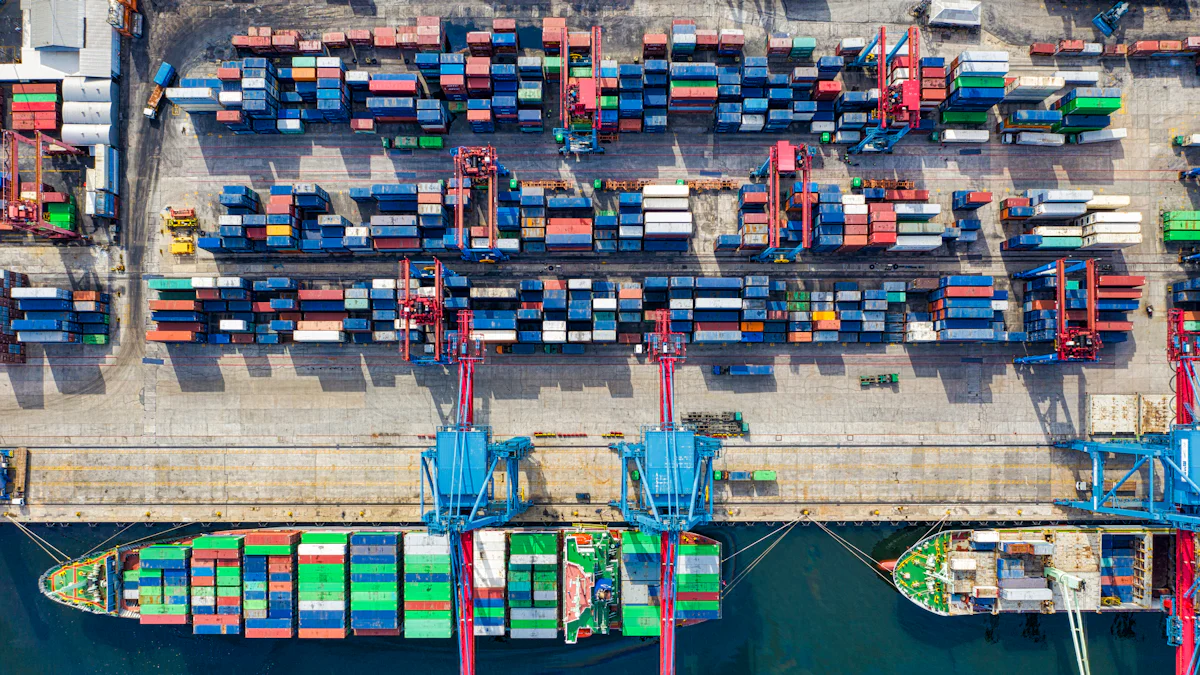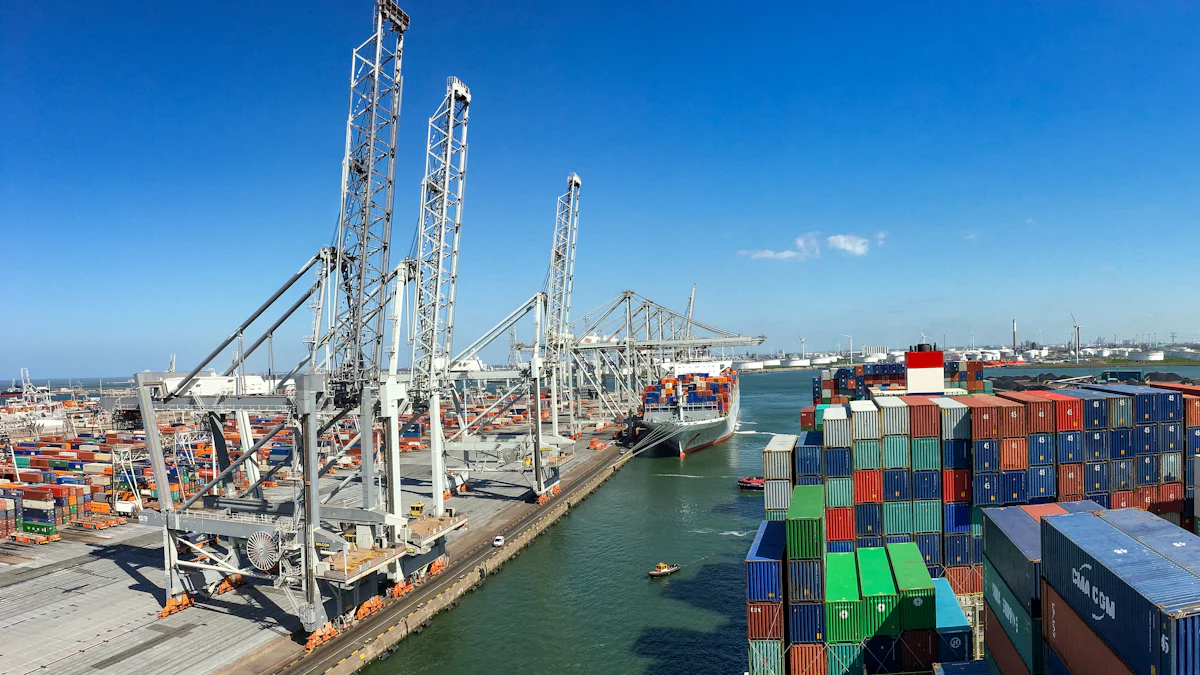Analyzing Multimodal Transport's Role in Manufacturing Logistics

Multimodal transport involves using multiple transportation modes to move goods efficiently. This approach optimizes logistics by integrating air, sea, rail, and road freight. Manufacturing logistics focuses on managing the flow of materials and products in production processes. Efficiency in logistics reduces costs and improves delivery times. Sustainability ensures long-term environmental health. Multimodal transport enhances logistics efficiency and sustainability. This method offers flexibility and cost savings. Businesses benefit from reduced transit times and lower carbon emissions. Multimodal transport reshapes logistics landscapes.
The Role of Multimodal Transport in Manufacturing Logistics

Enhancing Efficiency with Multimodal Transport
Multimodal transport plays a crucial role in enhancing efficiency within manufacturing logistics. The integration of various transport modes allows businesses to optimize their supply chains. Companies can choose the most suitable mode for each segment of the journey. This flexibility leads to significant improvements in delivery times and cost reductions.
Integration of Transport Modes
The integration of different transport modes creates seamless transitions between air, sea, rail, and road freight. Each mode offers unique advantages. For instance, air freight provides speed, while sea freight offers cost-effectiveness for large shipments. Rail and road transport ensure accessibility to remote areas. By leveraging these strengths, companies can achieve a more efficient logistics process.
Optimization of Routes
Route optimization is another key aspect of multimodal transport. Advanced technologies enable precise planning of routes. Companies can minimize transit times and reduce fuel consumption. This approach not only enhances efficiency but also contributes to sustainability. Reduced carbon emissions align with global environmental goals.
JUSDA's Multimodal Transport Solutions
JUSDA Supply Chain Management International Co., Ltd. exemplifies the effective use of multimodal transport solutions. The company offers comprehensive services that integrate multiple transport modes. These solutions cater to diverse logistics needs.
Ocean Freight Services
JUSDA's ocean freight services provide reliable and cost-effective options. The company ensures stable space allocation through a mature network. Full Container Load (FCL) and Less than Container Load (LCL) options offer flexibility. Value-added services, such as temperature-controlled transportation, enhance reliability.
Air Freight Services
Air freight services by JUSDA feature a robust route network. Established routes connect key regions like China, Mexico, and the United States. New routes expand connectivity further. The company optimizes costs through consolidation services. Efficient operations at airports ensure fast and secure deliveries.
Multimodal transport reshapes logistics landscapes. The integration of transport modes and route optimization drive efficiency. JUSDA's solutions highlight the benefits of this approach.
Sustainability in Logistics
Environmental Impact of Traditional Logistics
Traditional logistics heavily relies on singular modes of transportation. This reliance contributes significantly to environmental degradation. The logistics sector often faces criticism for its substantial carbon emissions. Fossil fuel consumption by trucks, ships, and planes results in high levels of greenhouse gases. These emissions contribute to global warming and climate change.
Resource consumption in traditional logistics is another pressing issue. The use of non-renewable resources for fuel and packaging materials strains the environment. Excessive resource usage leads to depletion and environmental harm. Inefficient logistics operations often result in waste generation. This waste further exacerbates environmental challenges.
Multimodal Transport as a Sustainable Solution
Multimodal transport offers a promising solution for sustainability in logistics. The integration of different transportation modes reduces the carbon footprint. Each mode can be selected based on efficiency and environmental impact. For instance, rail transport emits less carbon compared to road transport. By choosing rail for long-distance hauls, companies can lower emissions.
Energy efficiency is a key advantage of multimodal transport. The ability to switch between modes allows for optimal energy use. Companies can utilize sea freight for bulk shipments, which consumes less energy per ton-mile. Air freight can be reserved for urgent deliveries, minimizing unnecessary energy expenditure. This strategic use of transport modes enhances overall energy efficiency.
Scientific Research Findings:
Impact of Multimodal Transport on Logistics Efficiency and Sustainability highlights the role of multimodal solutions in improving sustainability. The study emphasizes the potential for reduced emissions and optimized energy use.
Scenarios for the Development of Multimodal Freight Transport in Katowice underscores the importance of sustainable practices. The research outlines how multimodal strategies can positively impact urban transport systems.
Multimodal transport not only addresses environmental concerns but also aligns with global sustainability goals. Companies adopting this approach can achieve significant reductions in their carbon footprint. The logistics industry can benefit from improved public perception and regulatory compliance. Sustainable logistics practices pave the way for a healthier planet and a more efficient supply chain.
Strategies for Implementing Multimodal Transport
Technological Innovations
Technological advancements play a crucial role in the successful implementation of multimodal transport. Digital platforms have emerged as essential tools for optimizing transportation processes. These platforms facilitate seamless integration across various modes of transport. Companies can efficiently manage logistics operations through these digital solutions.
Digital Platforms
Digital platforms provide a centralized system for managing multimodal transport. These platforms enable businesses to coordinate different transportation modes effectively. Companies can monitor shipments and optimize routes using these systems. This approach reduces transit times and enhances overall efficiency. Digital platforms also support data-driven decision-making, which improves logistics performance.
Real-time Tracking
Real-time tracking technology is vital for ensuring transparency in multimodal transport. This technology allows companies to monitor shipments throughout the journey. Businesses can identify potential delays and take corrective actions promptly. Real-time tracking enhances customer satisfaction by providing accurate delivery information. This technology also contributes to security by preventing cargo theft and loss.
Policy and Regulatory Frameworks
Policy and regulatory frameworks are essential for the smooth operation of multimodal transport. Government initiatives and industry standards play a significant role in shaping these frameworks. These policies ensure that transportation activities comply with environmental and safety regulations. Effective frameworks reduce delays and facilitate efficient cross-border transportation.
Government Initiatives
Government initiatives support the development of multimodal transport systems. Authorities implement policies that promote the integration of different transport modes. These initiatives aim to reduce carbon emissions and enhance sustainability. Governments also invest in infrastructure improvements to support multimodal logistics. These efforts contribute to the seamless movement of goods across regions.
Industry Standards
Industry standards establish guidelines for multimodal transport operations. These standards ensure consistency and reliability in logistics processes. Companies adhere to these standards to maintain quality and efficiency. Industry standards also facilitate international trade by harmonizing transportation practices. Compliance with these standards enhances the reputation of logistics providers.
Multimodal transport relies on technological innovations and regulatory frameworks for effective implementation. Digital platforms and real-time tracking improve logistics efficiency. Government initiatives and industry standards ensure compliance and sustainability. These strategies contribute to the success of multimodal transport in modern logistics.
Global Impact and Future Trends

Economic Benefits
Cost Savings
Multimodal transport offers significant cost savings for businesses. Companies can optimize logistics by selecting the most cost-effective transportation mode for each segment. This flexibility reduces reliance on a single mode, minimizing congestion and fuel consumption. Businesses benefit from lower operational costs and improved profit margins.
Market Expansion
Market expansion becomes more achievable with multimodal transport. Companies can access new markets by integrating various transportation methods. Enhanced efficiency and speed allow businesses to reach distant regions. This capability supports global trade and increases market presence. Businesses can capitalize on new opportunities and grow their customer base.
Future Trends in Multimodal Transport
Emerging Technologies
Emerging technologies will shape the future of multimodal transport. Innovations like autonomous vehicles and drones will revolutionize logistics. These technologies promise faster and more reliable deliveries. Companies can leverage these advancements to enhance efficiency and reduce costs. The logistics industry will see increased automation and improved service quality.
Global Collaborations
Global collaborations will drive the evolution of multimodal transport. Partnerships between countries and companies will facilitate seamless logistics operations. Collaborative efforts will improve infrastructure and streamline cross-border transportation. Businesses will benefit from shared resources and expertise. These collaborations will enhance global connectivity and support economic growth.
Multimodal transport transforms logistics by offering economic benefits and embracing future trends. Cost savings and market expansion highlight its impact. Emerging technologies and global collaborations will shape the industry's future.
Multimodal transport reshapes the logistics landscape by enhancing efficiency, sustainability, and resilience. Businesses can optimize supply chains and contribute to a sustainable future. The integration of different transport modes reduces carbon footprints and improves operational efficiency. Emerging technologies and policies further support this shift. Digital solutions play a crucial role in optimizing end-to-end transportation. Public transportation offers flexibility with excess capacity. Efficient multimodal systems must consider transportation demand and accessibility for all communities. The future outlook for multimodal transport in manufacturing logistics remains promising.
See Also
Exploring Efficient Logistics for Success in High-Tech Manufacturing
Harnessing Robotics in Logistics: Boosting Warehouse Efficiency
Unlocking AI's Potential in Logistics: A Closer Look
Revolutionizing Supply Chain Management with Big Data and AI
